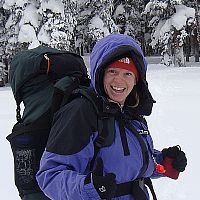SWES Colloquium Series 2013-2014
Ecohydrological Controls on Land-Atmosphere Interactions in Water-Limited Ecosystems
Marley 230
-
Catalina-Jemez, INVESTIGATOR
Presentation by Dr. Shirley Papuga
ABSTRACT: The exchange of water, energy, and carbon between the land surface and the atmosphere is largely influenced by vegetation. In turn, vegetation is strongly influenced by the partitioning of precipitation into evapotranspiration, soil moisture, and runoff. Ultimately, the hydrologic cycle exerts a strong control on the climate system. In fact, positive feedbacks between vegetation and the hydrologic cycle at small scales may have the ability to elicit non-linear responses with important large scale consequences. Therefore, capturing the synergies between hydrologic processes at different space and time scales is necessary for appropriately modeling the influence of vegetation and the hydrologic cycle on the climate system. Understanding the controls on land-atmosphere interactions and how they influence larger scale feedbacks will become increasingly important as climatic and other global changes continue to alter the water availability of our ecosystems.
Water-limited ecosystems are especially sensitive to precipitation changes, and therefore insights concerning how their functioning responds to possible changes in precipitation patterns are important in understanding future climate scenarios. Over a decade of field work from my research group has highlighted the importance of deep soil moisture (from large storms) in the healthy functioning of water-limited ecosystems. Given the importance of deep soil moisture, much of my current research addresses emergent hypotheses in ecohydrology of water-limited ecosystems using a simple framework – based on the presence or absence of moisture in two soil layers. Ultimately, my goal is to link small scale processes investigated in field with large scale processes using a modeling approach that can take advantage of this simple two-layer framework and remote sensing products. Importantly, I expect this approach can be used to address hypotheses in other ecosystems under increasingly water-limited scenarios (e.g. snow-dependent, agricultural, short-term drought).
Explore Further


